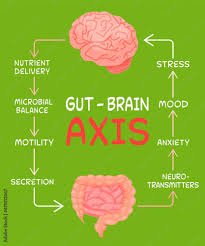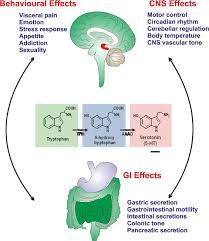How Gut Health Impacts Mental Health
Have you ever had a “gut feeling” about something? It turns out that’s more than just intuition. Your digestive system and your brain are deeply connected through what scientists call the gut-brain axis.
If you’re experiencing mood swings, anxiety, or brain fog, the root of the problem might actually be in your gut. Fortunately, improving gut health is one of the most powerful ways to support emotional balance, mental clarity, and overall well-being.
Let’s break down the science of how gut health affects your mood and what you can do about it.
What Is the Gut-Brain Axis?
The gut-brain axis is the communication pathway between your gut and your brain. This system includes the central nervous system, the enteric nervous system (your “second brain” in the gut), and the vagus nerve, which acts like a direct phone line between the two.
This isn’t just theory—over 90 percent of your body’s serotonin, a key mood-regulating chemical, is produced in the gut, not the brain. That means your digestion and your emotions are closely intertwined.
The Role of Neurotransmitters in the Gut
The trillions of bacteria living in your gut, known as the gut microbiome, influence the production of:
Serotonin (mood and well-being)
Dopamine (motivation and pleasure)
GABA (calm and relaxation)
When your microbiome is balanced, it helps your brain regulate mood and emotional stability. When it’s out of balance, it may contribute to anxiety, depression, or irritability.
How Gut Health Affects Your Mood
Poor gut health can send stress signals to the brain. It can also reduce the production of mood-supporting neurotransmitters and increase inflammation—both of which can negatively impact your mental state.
Signs Your Gut Might Be Impacting Your Mental Health
Chronic anxiety or frequent low mood
Brain fog or poor concentration
Fatigue despite restful sleep
Mood swings or irritability
Digestive discomfort like bloating or constipation
These symptoms are often seen in individuals with gut dysbiosis (an imbalance of good and bad bacteria), leaky gut, or chronic inflammation in the digestive tract.
To learn more about how gut health might be affecting your mood, connect with a registered dietitian for a personalized gut-brain health plan.
Foods That Improve Gut Health and Boost Mood
Your daily food choices can nourish your microbiome, reduce inflammation, and support the gut-brain connection. Here are key categories to focus on:
Prebiotic-Rich Foods
These feed the healthy bacteria in your gut and help them flourish.
Garlic
Onions
Asparagus
Green bananas
Oats
Probiotic Foods
These introduce beneficial bacteria into your digestive system.
Yogurt with live cultures
Kefir
Sauerkraut
Kimchi
Miso
Anti-Inflammatory, Gut-Healing Foods
These foods help soothe the gut lining and reduce inflammatory responses.
Berries
Leafy greens
Omega-3-rich foods (like salmon or flaxseeds)
Olive oil
Nuts and seeds
Including a wide variety of plant-based foods supports the diversity of your microbiome, which is crucial for resilience and emotional balance.
Best Probiotics for Anxiety and Gut Health
Probiotic supplements can help restore microbial balance, especially if you’ve taken antibiotics, experienced chronic stress, or have symptoms of gut imbalance.
What to Look for in a Probiotic
Contains strains like Lactobacillus rhamnosus or Bifidobacterium longum
Multi-strain formula with at least 10 billion CFUs
Delayed-release capsules to survive stomach acid
Top Picks:
Physician’s Choice Probiotics for Women – 50 billion CFUs, 10 strains, includes prebiotics
Ritual Synbiotic+ – Combines probiotics, prebiotics, and postbiotics in one capsule
Always choose third-party tested products and talk to a dietitian about what’s best for your individual needs.
FAQs: Gut Health and Mood Connection
Can gut health affect your mood?
Yes. The gut and brain are constantly communicating through the gut-brain axis. An imbalanced gut can contribute to changes in mood, stress levels, and even depression or anxiety.
What are the signs your gut is affecting your mental health?
You may notice mood swings, anxiety, fatigue, or foggy thinking—especially if they accompany digestive issues like bloating or constipation.
Can probiotics help with depression and anxiety?
Research suggests that specific strains of probiotics can reduce symptoms of stress, anxiety, and depression, especially when paired with a gut-supportive diet.
For clinical background on this, you can read this NIH article on probiotics and mental health.
How to Start Healing Your Gut for a Better Mood
Small steps can make a big impact. Here’s where to begin:
Eat more fiber-rich plant foods (aim for 30+ types weekly)
Include fermented foods daily
Limit processed foods and refined sugars
Stay hydrated and chew your food well
Consider a high-quality probiotic supplement
Reduce stress through mindfulness, movement, or breathing techniques
If you're unsure where to begin, work with a dietitian who specializes in gut health and mood regulation.
A Balanced Gut Supports a Balanced Mind
Your gut does far more than digest food. It helps regulate your mood, focus, and emotional well-being. By taking care of your gut with nourishing foods, targeted probiotics, and a balanced lifestyle, you can improve both your mental and physical health.
To start your gut-brain health journey with expert guidance, book a session with dietitian today.



